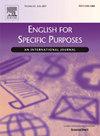企业领导人信息中的身份建构:基于语料库的自我提及跨语言研究
IF 2.7
1区 文学
Q1 LINGUISTICS
引用次数: 0
摘要
虽然自我提及在学术流派中得到了广泛的研究,但它在跨语言交际中的作用仍然相对较少。我基于语料库的跨语言研究通过研究美国和越南企业领导人如何在年度报告的声明中使用自我提及来构建他们的身份来解决这一差距。借鉴Lee(2024)的企业自我身份的三维框架,我使用Sketch Engine分析了70家美国和70家越南不同行业的CEO在2023年年报中自我提及的频率和搭配模式。结果显示,美国ceo在构建集体身份认同时,更喜欢用“我们的”而不是“我们的”。相比之下,越南ceo主要采用去个性化的公司引用来模糊他们的个人身份。两组人都使用自我提及的方式来强调感激、成就和信念;然而,美国的首席执行官们在与多个利益相关者互动方面做出了更大的口头努力。这些差异源于语言系统、社会文化规范、公司报告传统和商业环境的复杂相互作用。这些发现丰富了跨语言交际的文献,并为开发ESP材料和体裁教学法提供了有价值的见解。本文章由计算机程序翻译,如有差异,请以英文原文为准。
Identity construction in corporate leaders’ messages: A corpus-based cross-linguacultural study of self-mention
While self-mention has been widely researched in academic genres, its role in corporate communication across linguacultures remains relatively underexplored. My corpus-based cross-linguacultural study addresses this gap by examining how U.S. and Vietnamese corporate leaders employ self-mentions to construct their identities in their statements in annual reports. Drawing on Lee's (2024) three-dimensional framework of business-self identities, I used Sketch Engine to analyze the frequencies and collocational patterns of self-mentions in CEO statements from the 2023 annual reports of 70 U.S. and 70 Vietnamese companies across various sectors. The results showed that U.S. CEOs favored “our” over “we” to construct their collective identity. In contrast, Vietnamese CEOs mainly adopted depersonalized company references to obscure their individual identity. Both groups used self-mention devices to emphasize gratitude, achievements, and conviction; however, U.S. CEOs made greater rhetorical efforts to interact with multiple stakeholders. These variations arise from a complex interplay of linguistic systems, socio-cultural norms, corporate reporting traditions, and business environments. The findings enrich the literature on cross-linguacultural communication and offer valuable insights for developing ESP materials and genre-based pedagogy.
求助全文
通过发布文献求助,成功后即可免费获取论文全文。
去求助
来源期刊

English for Specific Purposes
LINGUISTICS-
CiteScore
5.70
自引率
8.00%
发文量
41
审稿时长
62 days
期刊介绍:
English For Specific Purposes is an international peer-reviewed journal that welcomes submissions from across the world. Authors are encouraged to submit articles and research/discussion notes on topics relevant to the teaching and learning of discourse for specific communities: academic, occupational, or otherwise specialized. Topics such as the following may be treated from the perspective of English for specific purposes: second language acquisition in specialized contexts, needs assessment, curriculum development and evaluation, materials preparation, discourse analysis, descriptions of specialized varieties of English.
 求助内容:
求助内容: 应助结果提醒方式:
应助结果提醒方式:


